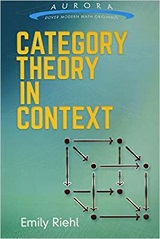
|
FreeComputerBooks.com
Links to Free Computer, Mathematics, Technical Books all over the World
|
|
- Title Category Theory in Context
- Author(s) Emily Riehl
- Publisher: Dover Publications (November 16, 2016); eBook (Johns Hopkins University)
- Permission: From the Author: Thanks to a special arrangement with Dover, I am also able to host a free PDF copy. This version is free to view and download for personal use only. Not for re-distribution, re-sale or use in derivative works.
- Hardcover/Paperback 272 pages
- eBook PDF (258 pages)
- Language: English
- ISBN-10/ASIN: 048680903X
- ISBN-13: 978-0486809038
- Share This:

|
Category theory has provided the foundations for many of the twentieth century's greatest advances in pure mathematics. This concise, original text for a one-semester introduction to the subject is derived from courses that author Emily Riehl taught at Harvard and Johns Hopkins Universities.
The treatment introduces the essential concepts of category theory: categories, functors, natural transformations, the Yoneda lemma, limits and colimits, adjunctions, monads, Kan extensions, and other topics.
Suitable for advanced undergraduates and graduate students in mathematics, the text provides tools for understanding and attacking difficult problems in algebra, number theory, algebraic geometry, and algebraic topology.
Drawing upon a broad range of mathematical examples from the categorical perspective, the author illustrates how the concepts and constructions of category theory arise from and illuminate more basic mathematical ideas.
About the Authors- Emily Riehl is an American mathematician who has contributed to higher category theory and homotopy theory. She is also the author of Categorical Homotopy Theory.
- Category Theory
- Algebra, Abstract Algebra, and Linear Algebra, etc.
- Graph Theory
- Applied Mathematics
- Functional Programming and Lambda
- Database Theory and Systems

- Category Theory in Context (Emily Riehl)
- The Mirror Site (1) - PDF
- The Mirror Site (2) - PDF
- Book Homepage
-
 An Invitation to Applied Category Theory: Seven Sketches
An Invitation to Applied Category Theory: Seven Sketches
Category theory is now a powerful tool in science, informatics, and industry. This book offers a self-contained tour of applied category theory. Each chapter follows a single thread motivated by a real-world application and discussed with category-theoretic tools.
-
 Topology: A Categorical Approach (Tai-Danae Bradley, et al)
Topology: A Categorical Approach (Tai-Danae Bradley, et al)
A graduate-level textbook that presents basic topology from the perspective of category theory. Many graduate students are familiar with the ideas of point-set topology and they are ready to learn something new about them.
-
 Basic Category Theory (Tom Leinster)
Basic Category Theory (Tom Leinster)
Assuming little mathematical background, this short introduction to Category Theory is ideal for beginning graduate students or advanced undergraduates learning category theory for the first time.
-
 Category Theory for the Sciences (David I. Spivak)
Category Theory for the Sciences (David I. Spivak)
Using databases as an entry to Category Theory, this book explains category theory by examples, and shows that category theory can be useful outside of mathematics as a rigorous, flexible, and coherent modeling language throughout the sciences.
-
 Category Theory for Programmers (Bartosz Milewski)
Category Theory for Programmers (Bartosz Milewski)
In this category theory for programmers, the author illustrates all major concepts using computer code. You are probably aware that functional languages are closer to math than the more popular imperative languages. They also offer more abstracting power.
-
 Category Theory for Computing Science (Michael Barr, et al.)
Category Theory for Computing Science (Michael Barr, et al.)
This book is a textbook in basic category theory, written specifically to be read by people in computing science. It expounds the constructions we feel are basic to category theory in the context of examples and applications to computing science.
-
 Categories, Types, and Structures (Andrea Asperti, et al)
Categories, Types, and Structures (Andrea Asperti, et al)
This book introduces Category Theory at a level appropriate for computer scientists and provides practical examples in the context of programming language design. It pursues the more complex mathematical semantics of data types and programs.
-
 Categorical Homotopy Theory (Emily Riehl)
Categorical Homotopy Theory (Emily Riehl)
This book develops abstract homotopy theory from the categorical perspective with a particular focus on examples. It helps consolidate and simplify one's understanding of derived functors, homotopy limits and colimits, and model categories, among others.
-
 Higher Topos Theory (Jacob Lurie)
Higher Topos Theory (Jacob Lurie)
This book presents the foundations of Higher Topos Theory, using the language of weak Kan complexes, and shows how existing theorems in algebraic topology can be reformulated and generalized in the theory's new language.
-
 Programming in Martin-Lof's Type Theory: An Introduction
Programming in Martin-Lof's Type Theory: An Introduction
This book focuses on the type theory developed by Per Martin-Lof. It contains a thorough introduction to the Martin-Lof's Type Theory, with information on polymorphic sets, subsets, monomorphic sets, and a full set of helpful examples.





